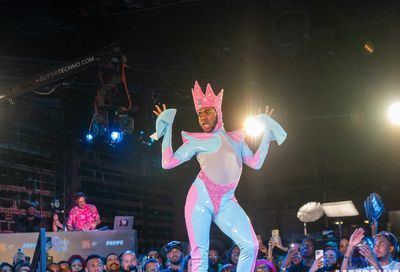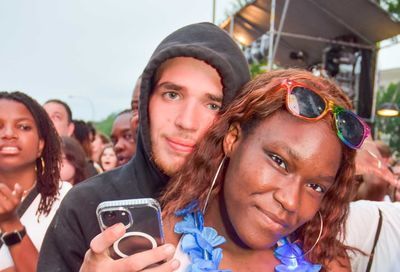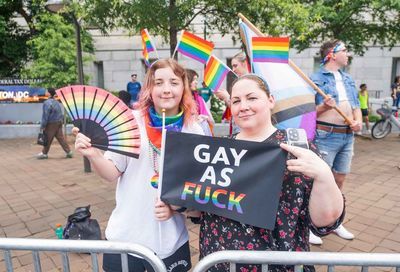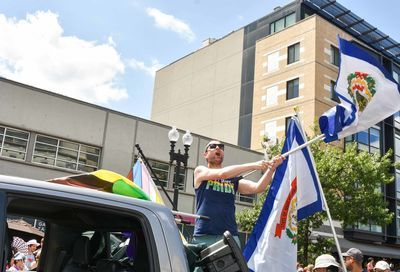Mean-Streets Memories
National award goes to gay man for his memoir of childhood on the streets, and for advocating for others
Vicki Wagner and Justin Reed Early met in another lifetime.
It was 30 years ago in Seattle that she was working as an outreach coordinator for homeless youth. Early was a just a child.
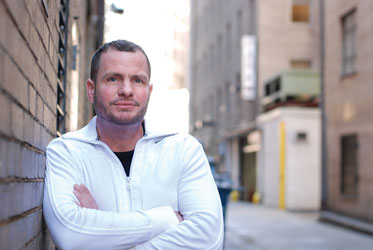
Justin Reed Early
(Photo by Todd Franson )
At 10, Early had just joined the ranks of America’s runaways. He was just one year away from working as a prostitute.
”He looked like a little girl,” Wagner says when thinking back to the ”nervous and skittish” boy with curly hair she met on Seattle’s Pike Street. ”He was actually being protected by a lot of the older street kids.”
That protection would not prevent Early from engaging in desperate acts — routine means of survival among homeless youth — eventually becoming a drug addict and criminal.
These three decades later, Wagner and Early cross paths again. This time it was in D.C., on Jan. 26, where Early, who is gay and now 40, was being honored with the National Network For Youth’s (NN4Y) Golden Pen Award for writing the autobiographical Street Child: An Unpaved Passage, released in November 2008. Wagner is the CEO of NN4Y.
”I think Justin’s book really portrays what happens to many young people that are homeless and on the street,” Wagner says, pointing especially to those who are LGBT.
”It is in some ways an invisible population,” Wagner adds. ”It’s gotten a little more recognized in the last few years, there’s been more research, more advocacy around that population of young people. In some ways they don’t have some of the same problems [as non-LGBT homeless youth]. They get kicked out of homes simply because of their status. Their parents find out, their parents are shocked, and they end up on the street that way.”
NN4Y is affiliated with about 500 organizations that serve more than 2.5 million homeless youth annually. Its offices are located in D.C. and Seattle. Wagner splits her time between the two locations.
Reflecting on his decision to share his story, Early says he decided to write Street Child in 2003 after watching an episode of NBC’s Dateline about Seattle’s ”Green River Killer.” That killer, Gary Leon Ridgway, was convicted and is currently serving multiple life sentences for brutally killing dozens of women in Washington state in the ’80s and ’90s. Roberta Joseph Hayes, one of those victims, was one of the street kids Early grew up with.
”I was waiting for them to mention her, to acknowledge her, and they didn’t,” Early says. ”It was very upsetting to me. That was really what launched the book. What I really wanted to do was to honor the kids’ lives who didn’t make it off the street. There were many who I grew up with that didn’t.”
Some of those youths were featured in a 1984 documentary titled Streetwise. Wagner says of those kids, Early, who now lives in Los Angeles, is the only one who successfully escaped the brutality of living on the street.
”They either ended up dead or really entrenched in the social-service or criminal-justice system,” she says.
It took Early four years to write his book.
He says it was not easy to revisit his dark past: the hatred he felt for his alcoholic and abusive father, the relationships he formed with pedophiles, the drug use that sometimes went wrong, a brutal rape, and a bloody suicide attempt.
”The tears wouldn’t stop running as I thought of the little boy who threw his life away to hurt his father, yet only destroyed himself,” Early wrote about being diagnosed as HIV-positive, for example.
”It was difficult to revisit those things,” he says when speaking to Metro Weekly, ”but I needed to articulate everything honestly.
”As uncomfortable as it was, and as tragic as it may be to read, it’s important to document what goes on when these kids go through the pain that they’re going through when they’re on the street. I wanted to bring it to the forefront of everybody’s awareness, because it’s such a big problem. We talk about everything but that. I mean, who wants to talk about a 12-year-old kid who’s using sex to survive? It’s hard to touch that subject.”
Wagner says that’s why Early is being honored with the Golden Pen Award, which encourages reporting that brings attention to the plight of street youth.
”What’s so unusual about Justin is that he’s used his experience and really tried to turn his life around, and is really trying to help other young people,” Wagner says. ”He’s been traveling the country, raising money for shelters around the country, doing book readings, and really trying to bring attention to the plight of homeless youth. That’s why the committee decided to give him the award.”
Throughout the memoir, Early also explores his struggles with self-acceptance as a gay man.
”When we come from environments that are discriminatory, it’s very hard for us to learn to love and accept ourselves,” he says. ”People put these positions and expectations on what they think we should be, and I think a lot of that comes from the right wing and a lot of religious organizations. Once we’re able to find our own way, and our own spiritual path, we can learn to love ourselves and be entitled to the spiritual gifts that everyone is entitled to. I feel like I’ve come to that point.”
The youngest of three brothers, Early is the only one who is still alive. His two brothers both died in their early 30s, one from a brain tumor, the other from AIDS-related illness. In a sense, he says, the street may have saved him.
”A lot kids leave home because it’s safer for them on the street. I couldn’t see surviving the experience that I had at home. I probably would have killed myself. That’s another thing that we deal with in the LGBT community: a lot of the kids who deal with such hatred and distaste from people that discriminate, they choose to end their lives.”
For more information about NN4Y, call 202-783-7949 or visit nn4youth.org. For more on Justin Reed Early, visit justinreedearly.com. For the National Runaway Switchboard, call 1-800-RUNAWAY (786-2929).
Support Metro Weekly’s Journalism
These are challenging times for news organizations. And yet it’s crucial we stay active and provide vital resources and information to both our local readers and the world. So won’t you please take a moment and consider supporting Metro Weekly with a membership? For as little as $5 a month, you can help ensure Metro Weekly magazine and MetroWeekly.com remain free, viable resources as we provide the best, most diverse, culturally-resonant LGBTQ coverage in both the D.C. region and around the world. Memberships come with exclusive perks and discounts, your own personal digital delivery of each week’s magazine (and an archive), access to our Member's Lounge when it launches this fall, and exclusive members-only items like Metro Weekly Membership Mugs and Tote Bags! Check out all our membership levels here and please join us today!


















